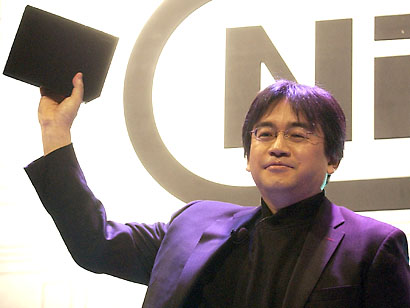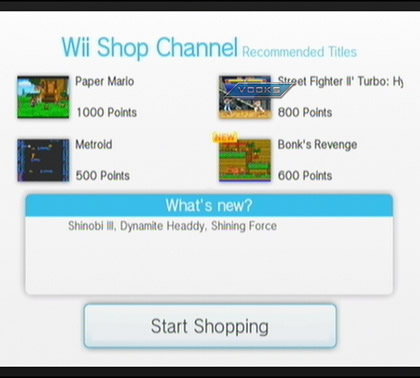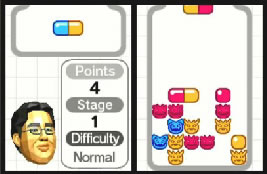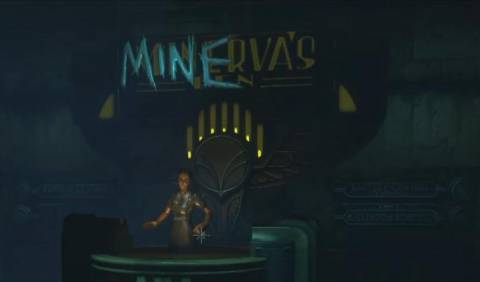
There are few executives in business, video game or otherwise, as frank and honest as Nintendo president Satoru Iwata.
Who else would write such a seemingly heartfelt letter to customers feeling burned by an unexpected price cut?
After announcing the impending 3DS price cut, sluggish sales of the hardware and a loss for the quarter, Iwata spoke with investors about the company's recent moves, thoughts on the future of the business and Nintendo's role in it and what lessons could be learned as Nintendo turns towards Wii U, set for a release in 2012.
I've picked out five key responses from Iwata, but I'd really recommend recommend reading the entire exchange at Nintendo's website.
On the Influence of Smartphones, Rise of Social Networks and Embracing Digital Distribution

"It has been said very often that Nintendo’s business is not as good as people had expected due to the influence of smartphones. We have repeatedly investigated whether social games, as well as smartphones, are actually affecting our business. We got the same results in our latest research that there are no causal correlations. Therefore, we will not touch on the details today as we have explained them several times before."
"On the other hand, it is the fact that a great variety of games are available at very low prices for smartphones. Naturally, consumers will choose more affordable ones if the video games we provide do not have much more value than those available for smartphones. However, no causal correlations have been confirmed because we think there are consumers who acknowledge that the value of what we offer does not equal to that of those available for smartphones and that what we offer holds unique value."
"Another trend which has captured people’s great interest today is the power of social networking, or its power to connect different people. The keyword 'social' has rapidly become very popular in these last two years and some say that Nintendo may be behind the social age. They might mean that Nintendo, uninterested in so-called social games from a business standpoint, fails to ride on the boom of social games. However, I have a totally opposite view - Nintendo has been a company attaching a high value to human relationships for a long time. We have our roots in the playthings connecting people as the company’s original business was playing cards. Therefore, we have always been aware of the human connections created by each of our products. It is true that on social networking services through the Internet you can make a relationship with those to which you could not connect with before. On the other hand, I think that there has been no best answer yet to the relationship between a real network and a virtual network. What we would like to realize is neither what the current social networking services provide nor what you can enjoy only with those in front of you, which Nintendo has provided before. The big theme for us is to provide new and fascinating human relationships composed of various networks, a real network with those close to you, a virtual network with those distant from you, and networks beyond description created by your experiences of sharing the same place with someone or of visiting certain places and specifically provided by SpotPass and StreetPass."
"Talking about whether there are other measures we can take other than the ones we are doing now to improve profitability, it is of course the same thing for the Wii U as for the Nintendo 3DS, but we think there are great new possibilities with what we can do in the digital business or, in other words, the digital distribution business. I am not going to go into detail about the business model today, but we have a strong determination to enlarge our digital business. This area is an area in which we have not been able to implement a good mechanism yet, or in which we have not been able to run our business well. We have made several attempts since we first made Wii Shop Channel for the Wii, but because we could not overcome some preconditions, the business hasn't grown to a satisfactory size yet. However, for the Nintendo 3DS and the Wii U, we are strongly focusing on development of such functions, so I believe we will be able to make new proposals such as 'The ratio of packaged titles and digital titles will be like this in the future' or 'The business for packaged titles and the business for the digital titles can be combined in this way.' I think I will be able to tell more specific stories in the near future, so taking these facts into regard, we would like to make efforts to improve our profitability even more."
How Recent Actions Could Influence Nintendo's Decisions for Wii U

"With regard to the influence on the Wii U, what we have to take most seriously is that the price markdown could damage the trust of the consumers who bought the Nintendo 3DS just after the launch. I feel greatly accountable for it. Our decision of the price markdown this time has a side effect that, at the launch of the Wii U, people may feel that the price might drop in the near future if they wait. Nevertheless, we have decided to cut down the price of the Nintendo 3DS as we consider it as a necessary decision now. What we will be able to do to recover the consumers' trust before the launch of the Wii U is very important to us. Since the Wii U we showed you at the E3 show in June was still in the development phase without very specific proposals on the software titles, we are going to announce the release date and the price next year when we are able to explain the specific proposals. Anyway, the biggest influence is on our consumers' trust, I think."
The Challenge of Reproducing Surprise Hits Like Brain Age

"Software such as Brain Age and Wii Fit have become such great hits that people often ask questions about the next unexpected big hits like Brain Age or Wii Fit. But even if I said something like, 'We have prepared the next revolutionary stuff like this,' it is usually a type of software that people think, 'How in the world would this sell?' However, the software which compels you to hold such a doubt, when it can become an explosive hit, can become a really great product. Therefore, there is no reality even if we say, 'We are developing something like this and it will sell just as Brain Age did.' It is not a game which looks like Brain Age, but we will be proposing something that consumers did not categorize as a video game in the past. It may be a Nintendo 3DS function, a new packaged software, software sold at the Nintendo eShop, software once sold at the Nintendo eShop then sold as a packaged game (like Art Academy for Nintendo DS) or something else, and out of those proposals we cannot tell exactly which one or ones of them will become big hits, so we are considering multiple proposals. Some of them will come out during this fiscal year and some are planned for next fiscal year. We hope, in the end, you will look back and say, 'that particular software further accelerated the penetration of the Nintendo 3DS.'"
Why Nintendo Could React So Quickly With a 3DS Price Cut
"Maybe the reason we were able to make the markdown decision is our lesson from Nintendo GameCube. Therefore, in that sense, it was slightly a personal decision, meaning that the current executives, who are the ones who make the decisions, all experienced, 'there was a chance for the Nintendo GameCube but we were not able to capitalize on it,' and I think that was a large factor, that the executive all shared this sense, not just myself. One other factor is our financial characteristics. I have repeatedly said, 'Please allow us to hold high liquidity of assets since this business has very high risks. We can have more options if we have high liquidity.' During those days, when the Wii and the Nintendo DS were in a continuous good cycle, we had cases where people asked us, 'Well, won't you be all right even without holding so much cash?' But it must be a factor to our ability to make decisions like these under situation like this, and along with this, proceed with the development of the Wii U and take on its business risks. We will put our best efforts to make this decision a good one."
Nintendo's Resistance to Microtransactions and Downloadable Content
"To the question, 'What will Nintendo do in the future regarding micro-transactions?' or 'How will Nintendo prepare micro-transactions for its platforms?' we are preparing a system for micro-transactions and so-called add-on content for both the Nintendo 3DS and the Wii U, and for the Nintendo 3DS we are targeting to release something this calendar year. This means that we will be able to give flexible options to software developers on our platform, but 'what to do with Nintendo's policy as a software developer' is a separate issue.

This is a good opportunity, so I would like to talk about what Nintendo is thinking as a software developer. Generally, it may be thought that Nintendo is reluctant toward micro-transactions, meaning that Nintendo is not interested in gaining profit through add-on content or micro-transactions. I have been discussing this topic with Mr. Miyamoto for a fairly long time. For example, let's say there is an occasion where a user says, 'I'm done playing this game but I would play it more if there were additional stages,' and we were able to focus the right amount of energy to develop additional stages and that way, by distributing the additional stages, we were able to extend the life-span of the game or stimulate social topics, or increase sales. Then, we would discuss whether we could sell the add-on content at a price where both Nintendo and consumers would be satisfied.
For example, in the future, I think it will be all right to have a situation where we prepare an additional stage and say to consumers, 'Can you pay some more to play this?' On the other hand, and I'd like to emphasize that this is only me talking from Nintendo's point of view of what we want Nintendo to do, and we do not intend to comment on whether another company is right or wrong, and I would like to avoid any misunderstandings on this point, but, I would also like to mention that, under Nintendo's set of values "charging money just for changing the parameters to unlock something or to allow some large advantage," is a totally different earnings structure that is not compensation for creative work and, while pursuing this may create short-term profits, Mr. Miyamoto and I discussed that we should not use this type of billing system since we think that we will not be able to make long-term relationships with our consumers."
Again, for more insightful comments, read the five-page question-and-answer on Nintendo's website.